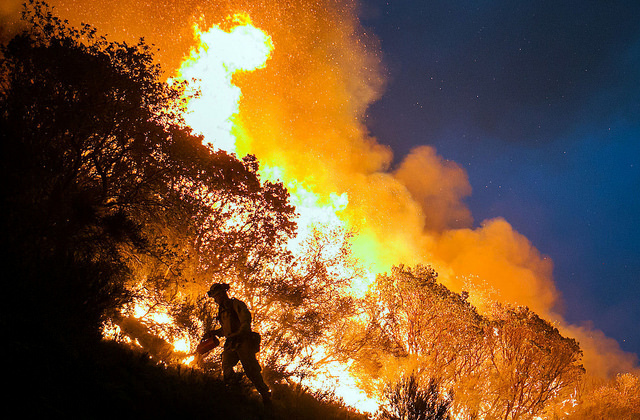Do extreme weather events spur local discussion and action about climate change?
Published in Social Sciences

In November 2012, in the shadow of one of the most devastating extreme weather-related events in the state’s history, New York Governor Andrew Cuomo called Hurricane Sandy “a wake-up call.” He went on to say that, “climate change, extreme weather, call it what you will, and our vulnerability to it, has existed for a long time and that we have been blind to it. Anyone who says that there is not a dramatic change in weather patterns,” he observed, “is denying reality”.
This was the first time that I remember hearing a high-profile U.S. political figure making a dire and direct connection between climate change and an extreme weather event following the event itself – and, even more importantly, calling for a rigorous plan of action as a result. At the same time, several scholars were arguing that extreme weather events – predicted to become more frequent and more severe with a changing climate – might provide the best opportunity for changing public attitudes, and perhaps behavior, toward climate change.
This was the animating force behind this research project: If extreme weather events provide one of the best opportunities for “teachable moments” about climate change, are we learning from the lessons they provide? Through a systematic comparison across 15 communities that experienced an extreme weather event between 2012 and 2015, we sought to understand if, how and when communities might undertake significant climate-related action – in terms of collective mobilization and governmental policy. We purposely selected different types of extreme weather events from across the country.
Though we found little evidence of local collective mobilization around a climate change post-event, more than half of the communities did publicly discuss links between the event they experienced and climate change. Local reactions to an extreme weather event depended both on aspects of the event itself, but also on political leanings and resources within the community before the event took place.
Yet, even in communities where climate change was discussed in relation to the weather event, it was often a marginal issue. Other more immediate concerns, such as emergency response management and economic recovery, generated far more discussion and subsequent action. Some of those interviewed suggested that broaching the topic of climate change amid disaster recovery efforts could be interpreted as using a tragedy to advance a political agenda.
One critical insight is that communicators and change agents need to proceed with caution in the wake of an extreme weather event. Some residents, who may be coping with both personal and community loss, might not be emotionally ready for discussions about climate change. At the same time, some segments of the population might be eager to have such discussions and to take action – particularly actions related to adaptation and preparation for future events. Such discussions might be particularly fruitful in locations that have experienced multiple events in a short period or among residents in near-miss locations – areas that missed a direct hit by the event but were close enough to it to witness the impact. Finally, our work suggests that the experience of extreme weather events may offer opportunities for tailoring climate change communication efforts to the local experience. For example, in the wake of the 2015 floods in Richland, South Carolina, despite a strong reluctance to use the term “global warming,” we found some evidence of increased dialogue about climate change, due to both the event itself and observations of extreme events in other communities.
While our work challenges the notion that a single extreme weather event will yield rapid social mobilization around climate change, we did find evidence that communities make post-event changes to ensure more effective responses to future events. Furthermore, a tipping point may exist at which such event experiences, especially in combination with exposure to other instances of extreme weather, move individuals and communities to act to slow the progress of climate change. Whether that will come soon enough to mitigate the projected risks of climate change, remains to be seen.
Follow the Topic
-
Nature Climate Change

A monthly journal dedicated to publishing the most significant and cutting-edge research on the nature, underlying causes or impacts of global climate change and its implications for the economy, policy and the world at large.



Please sign in or register for FREE
If you are a registered user on Research Communities by Springer Nature, please sign in
Great article! Similar issues are playing out in Australia with contested media narratives on extreme weather events and their attribution to climate change; presently bush fires, after mass coral bleaching in 2016 and 2017. I note some parallels in your findings with our study in the Great Barrier Reef published earlier this year: https://www.nature.com/articles/s41558-019-0504-y
Thanks for sharing!
Thanks for reading. Looking forward to reading your work.